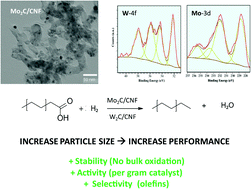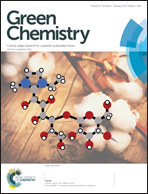Structure–performance relations of molybdenum- and tungsten carbide catalysts for deoxygenation†
Abstract
This work demonstrates for the first time that carbide particle size is a critical factor for the activity and stability of carbon supported tungsten- and molybdenum carbide catalysts in (hydro-)deoxygenation reactions. The stability of the catalyst was shown to increase for larger particles due to the improved resistance of the metal carbide phase against full oxidation to crystalline metal oxides under reaction conditions. In addition to the improved catalyst stability, supported molybdenum carbides were found to more than double their weight-based catalytic activity upon increasing carbide particle size from 2 to 10 nanometers. The strongly improved (de-)hydrogenation activity of these larger carbide particles also facilitated a new deoxygenation pathway for fatty acids, in which an initial hydrogenation to fatty-aldehyde is combined with a decarbonylation step. This is the first time in which this deoxygenation pathway is observed over supported tungsten- or molybdenum carbide catalysts.


 Please wait while we load your content...
Please wait while we load your content...